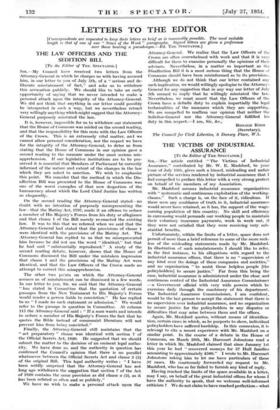LETTERS TO THE EDITOR
[Correspondents are requested to keep their letters as brief as is reasonably possible. The most suitable length is that of one of our " News of the Week" paragraphs. Signed letters are given a preference over those bearing a pseudonym.—Ed. THE SPECTATOR.]
THE LAW OFFICERS AND THE SEDITION BILL
[To the Editor of THE SPECTATOR.] SIR,—My Council have received two letters from the Attorney-General in which he charges us with having accused him, in our letter to you of July 5th, of a " serious and de- liberate misstatement of fact," and asks us to withdraw this accusation publicly. We should like to take an early opportunity of saying that we never intended to make a personal attack upon the integrity of the Attorney-General. We did not think that anything in our letter could possibly be interpreted in such a way, but we nevertheless retract very willingly anything which might suggest that the Attorney- General purposely misstated the law.
It is, however, impossible for us to withdraw our statement that the House of Commons was misled on the second reading, and that the responsibility for this rests with the Law Officers of the Crown. This is an extremely vital matter, and we cannot allow personal consideration, nor the respect we have for the integrity of the Attorney-General, to deter us from stating that the House of Commons in our opinion gave a second reading to the measure under the most serious mis- apprehension. If our legislative institutions are to be pre- served it is essential that Members of Parliament be correctly informed of the nature and extent of the changes in the law which they are asked to sanction. We wish to emphasize this point. We consider that the method in which the Dis- affection Bill was presented to the House of Commons was one of the worst examples of that new despotism of the bureaucracy about which the Lord Chief Justice has written so eloquently.
On the second reading the Attorney-General stated—no doubt with no intention of purposely misrepresenting the law—that the Mutiny Act, 1797, made it an offence to seduce a member of His Majesty's Forces from his duty or allegiance and that clause 1 of the Bill merely re-enacted the existing law. It was to this that we referred when we said that the Attorney-General had stated that the provisions of clause 1 were identical with the provisions of the Mutiny Act. The Attorney-General has replied to us that we misrepresented him because he did not use the word " identical," but that he had said " substantially reproduced." A study of the second reading debate, hriwever, shows that the House of Commons discussed the Bill under the mistaken impression that clause 1 and the provisions of the Mutiny Act were identical, and that the Law Officers of the Crown made no attempt to correct this misapprehension.
The other two po'nts on which the Attorney-General accuses us of misstatement can be dismissed in a few words. In our letter to you, Sir, we said that the Attorney-General " has stated in Committee that the quotation of certain passages from the New Testament to His Majesty's Forces would render a person liable to conviction." He has replied to us " I made no such statement or admission." We would refer to the passage in question in Committee. At column 115 the Attorney-General said : " If a man wants and intends to seduce a member of His Majesty's Forces the fact that he quotes the Bible instead of communist literature will not prevent him from being convicted."
Finally, the Attorney-General still maintains that the " act preparatory " clause was identical with section 7 of the Official Secrets Act, 1920. He suggested that we should submit the matter to the decision of an eminent legal autho- rity. We have done so, and the authority in question has confirmed the Council's opinion that there is no parallel whatsoever between the Official Secrets Act and clause 2 (2) of the original Bill. This legal authority writes : " I have been mildly surprised that the Attorney-General has not long ago withdrawn the suggestion that section 7 of the Act of 1920 contains the same provision as did clause a (2), as it has been refuted so often and so publicly."
We have no wish to make a personal attack upon the Attorney-General. We realize that the Law Officeis of the Crown are often overwhelmed with work and that it is very difficult for them to examine personally the opinions of their advisers. Nevertheless, in a matter so important as the Disaffection Bill it is a most serious thing that the House of Commons should have been misinformed as to its provisions.
Although we do not think that our letter contained any such implication, we would willingly apologize to the Attorney- General for any suggestion that in any way our letter of July 5th seemed to imply that he willingly misstated the law. Nevertheless, we must assert that theLaw Officers of the Crown have a definite duty to explain -impartially the legal technicalities of the measures which they are supporting. We are compelled to reaffirm 'our opinion that neither the Solicitor-General nor the Attorney-General fulfilled his duty in this respect.—I am, Sir, &c.,
The Council for Civil Liberties, 3 Dansey Place, W.1.


































 Previous page
Previous page